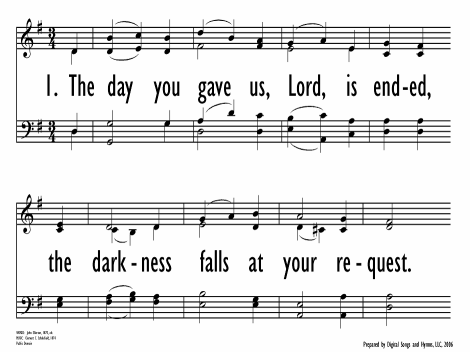John Ellerton (b. London, England, 1826; d. Torquay, Devonshire, England, 1893) wrote this evening hymn (and 319) in 1870 for A Liturgy for Missionary Meetings. The text's dominant theme is the growing worldwide fellowship of the Christian church and its unbroken, unceasing offering of praise and prayer to God. Even though Victoria may have chosen the hymn to symbolize the British Empire, stanza 4 wisely reminds us that earthly kingdoms pass away–only the kingdom of God stands and grows forever.
Educated at King William's College on the Isle of Man and at Trinity College, Cambridge, England, Ellerton was ordained in the Church of England in 1851. He served six parishes, spending the longest time in Crewe Green (1860-1872), a church of steelworkers and farmers. Ellerton wrote and translated about eighty hymns, many of which are still sung today. He helped to compile Church Hymns and wrote its handbook, Notes and Illustrations to Church Hymns (1882). Some of his other hymn texts were published in The London Mission Hymn Book(1884).
Scripture References:
st. 3 = Ps. 113:3
John Ellerton (b. London, England, 1826; d. Torquay, Devonshire, England, 1893) wrote this evening hymn (and 319) in 1870 for A Liturgy for Missionary Meetings. The text's dominant theme is the growing worldwide fellowship of the Christian church and its unbroken, unceasing offering of praise and prayer to God. Even though Victoria may have chosen the hymn to symbolize the British Empire, stanza 4 wisely reminds us that earthly kingdoms pass away–only the kingdom of God stands and grows forever.
Ellerton borrowed the hymn's first line from an anonymous text in Church Poetry (1843). He then revised his text for the hymn's publication in the Society for the Promotion of Christian Knowledge's Church Hymns (1871), of which he was coeditor. Possibly prompted by the suitability of the worldwide church image as a symbol for the British Empire "on which the sun never sets," Queen Victoria chose this hymn to celebrate her Diamond Jubilee in 1897. Victoria's use of the hymn assured its populari¬ty in the English-speaking world.
Educated at King William's College on the Isle of Man and at Trinity College, Cambridge, England, Ellerton was ordained in the Church of England in 1851. He served six parishes, spending the longest time in Crewe Green (1860-1872), a church of steelworkers and farmers. Ellerton wrote and translated about eighty hymns, many of which are still sung today. He helped to compile Church Hymns and wrote its handbook, Notes and Illustrations to Church Hymns (1882). Some of his other hymn texts were published in The London Mission Hymn Book(1884).
Liturgical Use:
An evening hymn at the close of worship (st. 1 is only for evening use); a missionary hymn; at festivals of the church: Pentecost, worldwide communion, All Saints/Reformation Day.
--Psalter Hymnal Handbook
Hymnary Pro Subscribers
Access
an additional article
on the Canterbury Dictionary of Hymnology:
Hymnary Pro subscribers have full access to the Canterbury Dictionary of Hymnology.
Subscribe now


 My Starred Hymns
My Starred Hymns








